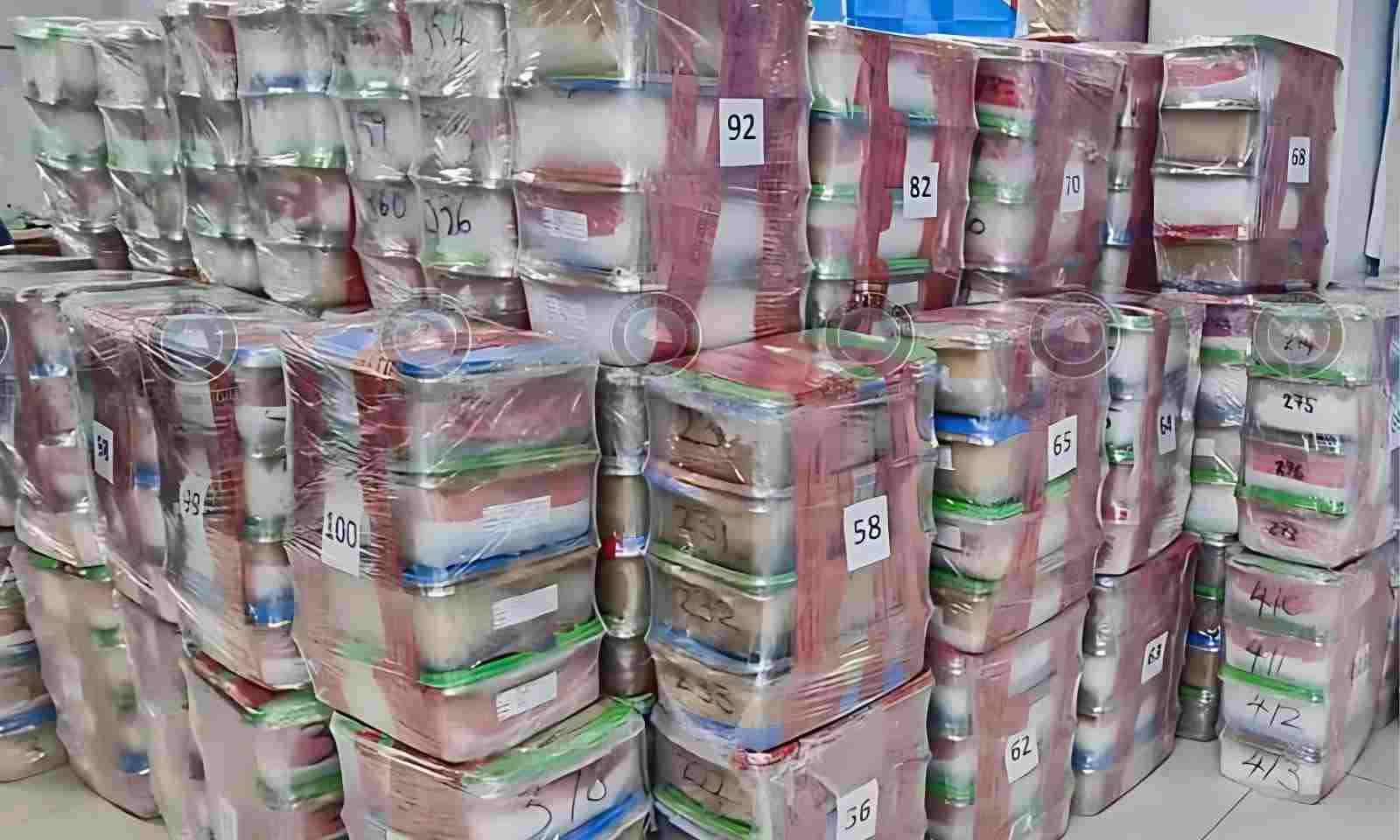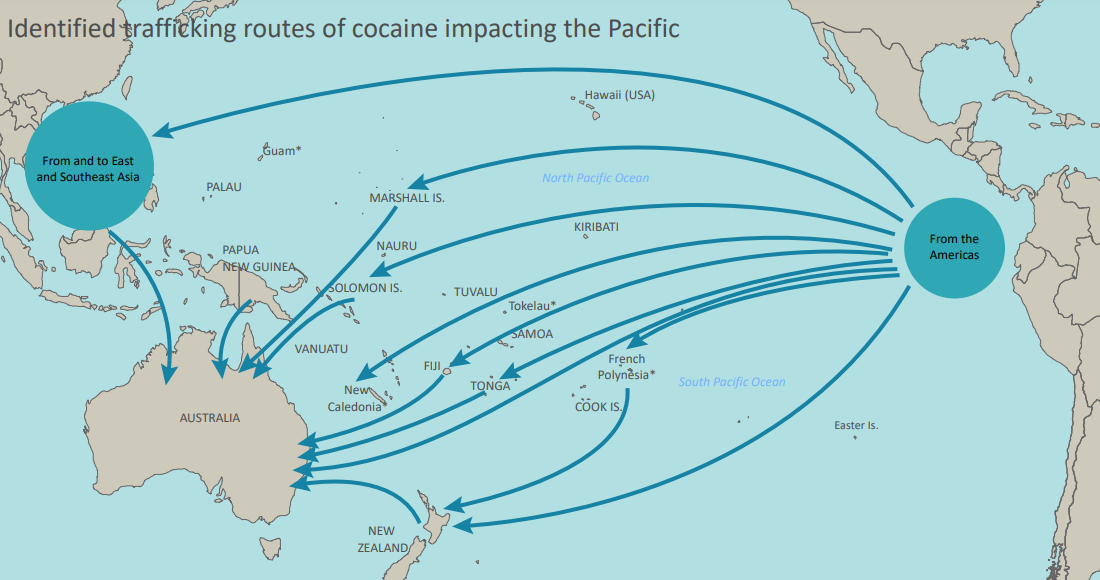

Steve Symon is the chair of the Ministerial Advisory Group on Transnational, Serious and Organised Crime.
Photo/File/Fiji Police
Calls for urgent regional unity against organised crime in the Pacific
Experts warn that a fragmented response is failing as the report recommends appointing a dedicated minister, specialist teams, and strengthening collaboration to tackle organised crime.




Moana Pasifika end Lautoka curse to win 'Battle of the Pacific'



Budget relief buys time for Ōtara-Papatoetoe, but pressures remain


Moana Pasifika end Lautoka curse to win 'Battle of the Pacific'

Organised crime is escalating across the Pacific, with the region increasingly becoming a hub for methamphetamine, cocaine, and other illicit goods, a new report warns.
New Zealand, in particular, is a major destination for these drugs, which is driving criminal activity along Pacific supply routes.
Steve Symon, chair of the Ministerial Advisory Group on Transnational Serious and Organised Crime, says the scale of the problem is growing fast.
Speaking with William Terite on Pacific Mornings, Symon says the lucrative local market is driving the drug trade.
“We know that New Zealand consumes twice as much methamphetamine as we did last year, and one out of 10 New Zealanders is the victim of online fraud,” he says.
“There’s more and more migrant exploitation happening, and the Pacific is being used as a gateway for a lot of those commodities to come to places like New Zealand and Australia.”
Watch Steve Symon's full interview below.
The report, Lead Boldly, Act Decisively: Tackling and Dismantling Organised Crime, states that 17 Pacific nations are facing rising drug use, corruption, and criminal infiltration. Some regions are at risk of being “overrun by organised crime”, especially with the advent of unmanned “narco-subs”.
The final report coincides with a meeting of leaders in Chile for the South Pacific Defence Ministers’ Meeting. New Zealand’s Associate Defence Minister, Chris Penk, says there’s a need for a collaborative response.
“There are many things that we need to consider from a defence and a security point of view, and that's before you get to transnational crime and the threat to shipping lanes.”

In 2024, Fiji police seized more than four tonnes of methamphetamine in Nadi. Photo/Fiji Police
In a landmark case in August, a Fijian court sentenced Justin Ho to life in prison for importing 4.15 tonnes of methamphetamine. Tonga is also struggling with its own crisis, with reports of children as young as eight years old being involved in drug dealing.
Reflecting on his two decades working as a Crown prosecutor, Symon says the quantities of drugs being stopped at the border in just one week now rival what used to be confiscated in an entire year.
“We're seeing those come through Asia, from South America through the Pacific. Customs and the police are stopping more drugs than ever, but it's the scale of the problem overseas that's coming here. Methamphetamine is now being made in super labs in South America and in Asia.”
Symon says corruption in the region is a serious challenge as major bribes can make even the most diligent workers vulnerable.
“On my recent trip to Fiji with Minister [Casey] Costello, I'm meeting with police officers, customs officers, who are earning maybe $20,000 Fijian dollars [NZ$15,000] a year and they are being offered the same amount to turn a blind eye: ‘Don’t go to this place for one night and we will pay you the same amount of money you earn in an entire year’, so it's very challenging.”
In the report, Richard Chambers, Commissioner of Police, says organised crime compromises national safety and wellbeing and must be tackled ‘head on’. “Organised crime isn’t just about drugs and money laundering - it is driving some of the most serious violence and harm in communities across our country. Organised crime is a threat to our national security.”

Identified trafficking routes of cocaine impacting the Pacific. Photo/UNODC
A coordinated, full-scale approach
The report calls for a prevention-led, full-scale approach and collaboration with Pacific neighbours to disrupt criminal networks before they reach New Zealand.
Recommendations include deploying specialist teams of investigators and prosecutors to respond to acute issues in the Pacific and implementing a Pacific Anti-Corruption Strategy with co-designed initiatives and vetting standards for high-risk industries.
Symon stresses the need for coordinated leadership, saying our current response to organised crime is spread across 13 different government ministries.
“What we've recommended is a way to bring that all together, to coordinate that, to make sure there's accountability, starting with a Minister of Organised Crime, so that the public can look and say, ‘this is the person responsible for helping us fight organised crime’, and then providing them the resources to do that, both here and in the Pacific.”
He also highlights vulnerabilities within the migrant workforce and cash remittances, saying, “Cash is king when it comes to organised crime, whereas electronic transfers are much easier for the authorities to track.

The report warns migrant works may be more vulnerable to exploitation, along with cash payments from ill-gotten gains. Photo/File
“They can have what looks like a legitimate business, but actually paying people under the table or not paying them enough, or bonding them to do the work.”
Symon warns that a partial response would fail, emphasising that public engagement and support are essential to building a safer future.
“If you do a watered-down version, it won't work and we'll be back here in five years and the problem will be much worse.
“Kiwis care… We care about New Zealand, we care about the future we want for our children and we care about the Pacific… there is hope there and we're trying to harness that hope and turn it into a solution for our country and for the Pacific.”